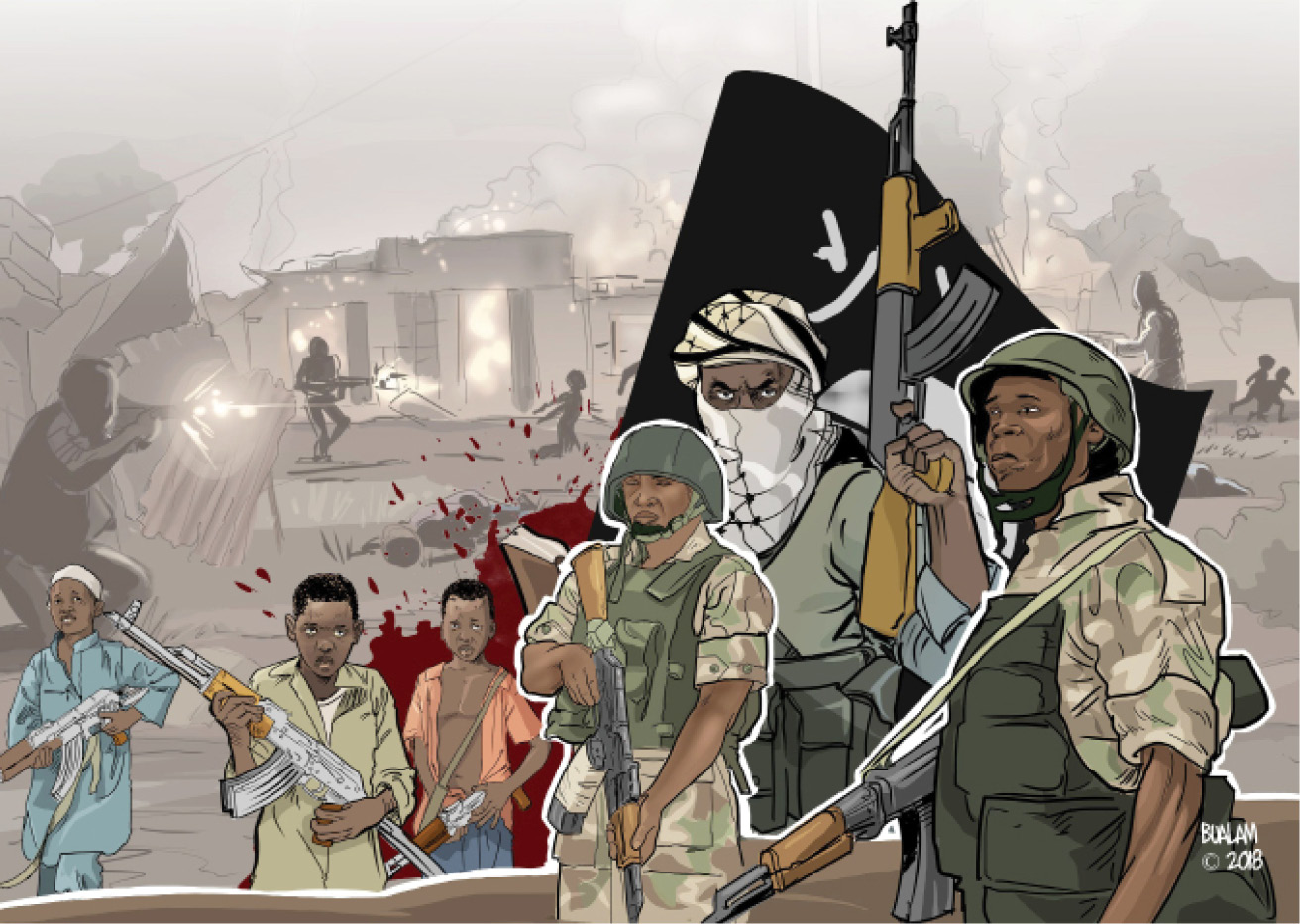Rewind the clock back to December 2020. The routinised official reactions to the latest tragedy, the slaughtering of farmers in Zabarmari, Borno State, have run their course. The routine howls of condemnation have petered out. The dead have been buried. We don’t even know for sure how many were slaughtered. Which is correct: the official figure of 43 or the UNDP figure of 110? Whichever it is, they were unknown farmers. Mere statistics in life; mere statistics in death. We are set to settle back into the routine, chalking the tragedy up as the work of the devil for which not even the Nigerian state should be blamed.
But northern Nigeria bleeds.
Buhari has sent relief materials to the surviving victims of the slaughter; a gesture of presidential empathy, I bet. The farmers in Zabarmari have always produced their own food and fed themselves, needing no handouts of relief materials such as food from a caring president. All they hoped for was for the Nigerian state to protect them and their right to continue to eke a living from their small peasant holdings in safety. The Nigerian state let them down and the murderous Boko Haram insurgents moved in, slaughtered them and denied them the right to life.
Northern Nigeria bleeds.
The Sultan of Sokoto, His Eminence Sa’ad Abubakar, said the north is the worst place to live in the country today. Right. Nowhere in the old region is safe. Bandits, kidnappers, armed robbers and sundry criminal elements hitherto unheard of in the north have taken over and filled the vacuum created by the absence of federal and state governments.
Northern Nigeria bleeds.
Daily Trust of November 28, 2020, reported that in eleven months, 1,570 people were abducted in various parts of the north. The kidnappers demanded over N6.9 billion as ransom; the victims managed to secure their freedom with N311 million. The sultan said people go to bed with wands of money under their pillows to buy their freedom in case the kidnappers rouse them from sleep in the dead of night. It is no way for citizens to live in their own country.
Northern Nigeria bleeds.
The Daily Trust of November 30, 2020, quoted the president of the All Famers Association of Nigeria, Kabiru Ibrahim, as saying that farmers have abandoned their farms for fear of being killed or kidnapped. He said, “In the North-East, the situation is almost eleven years old and with no end in sight. No farmer will readily go to the farm with his slaughter going on. The already fragile food system will be adversely affected by the development.”
Northern Nigeria bleeds.
In the wake of the Zabarmari slaughter, the governor of Borno State, Professor Babagana Zulum, asked the federal government to let the foreign mercenaries return. The demand reflects his loss of confidence in the capacity of the military to defeat Boko Haram. His state has borne the brunt of the Boko Haram insurgency since 2009. According to the Daily Trust, former President Goodluck Jonathan brought the South African mercenaries ahead of the 2015 general elections. The mercenaries cleared Sambisa forest and the Mandara mountains of Boko Haram and made it possible for elections to be conducted in those areas. Jonathan similarly entered into an agreement with President Idriss Deby of Chad under which the Chadian military routed Boko Haram from the Lake Chad area.
When Buhari assumed office as president in May 2015, the agreements were not renewed. The mercenaries with proven capacity to defeat the insurgents, were sent back home. Perhaps Buhari thought he had a home-grown solution that made the assistance of foreigners unnecessary. We expected that magic, not least because he is a northerner and a two-star general with a civil war experience. Despite the presence of the various security outfits in Borno and Yobe states, Boko Haram continues to reign, unleashing a reign of terror on the people. They decide when and where to strike and make our security forces inept. No one knows how many girls and women they have taken away since they kidnapped the over 200 students from Chibok in 2014.
Northern Nigeria bleeds.
The north has bled enough. It is time to stop the bleeding. Every drop of bled shed by Boko Haram is the blood of an innocent fellow Nigerian. Every naira paid by a kidnapped victim to secure his freedom is an indictment of the Nigerian state. The demand for rejigging the security architecture does not question the president’s wisdom but it raises questions about his willingness to listen to voices other than his own. Omniscience is not one of the qualifications we take into consideration in electing our president.
Northern Nigeria must not continue to bleed. Buhari has a duty, as president and as a northerner, to stop the bleeding and make the north, and indeed, the country safe again. Everything in a nation rides on security. Without security, there can be no social and economic development. There is no way an insecure nation or community can enjoy peace and commit to its development. In making security the number one constitutional obligation for the federal government, the framers of the constitution knew only too well that security is the foundation for national development.
The president is busy awarding road contracts. But it is useless pouring billions of Naira into road construction when, because of insecurity, the roads would only be abandoned.
It bears repeating, Northern Nigeria is the poorest region in the country. Eighty per cent of the 100 million extremely poor people in the country are in the north. With heightened insecurity, no one should expect the situation to get better. Peasant farmers in Northern Nigeria feed the nation. They have been forced to abandon their farms with the twin unpleasant consequences of food scarcity, hunger and even famine and, of course, the deepening of their poverty.
Kidnappers reign, making life brutish and impossible for fellow Nigerian citizens. Governor Mohammed Sani Bello of Niger State weeps over the fact that bandits control seven local governments in his state. Governor Zullum of Borno warns that ISWAP is muscling into his state. Governor Muttawale of Zamfara wrings his hands in helplessness. So does his Katsina counterpart, Aminu Masari. Students of Federal Government College, Birnin Yauri and those of Bethel Baptist High School, Kujama, have been held in captivity for more than eight months. Their parents are in agony; their future has been arrested because their country is absent in their lives.
General Abdulsalami Abubakar also wails: “We are facing a very hard time in this country.”
Northern Nigeria continues to bleed. It is the worst of the times.
(This is a slightly edited version of my earlier column titled, Northern Nigeria bleeds, first published on December 22, 2020).

 Join Daily Trust WhatsApp Community For Quick Access To News and Happenings Around You.
Join Daily Trust WhatsApp Community For Quick Access To News and Happenings Around You.


